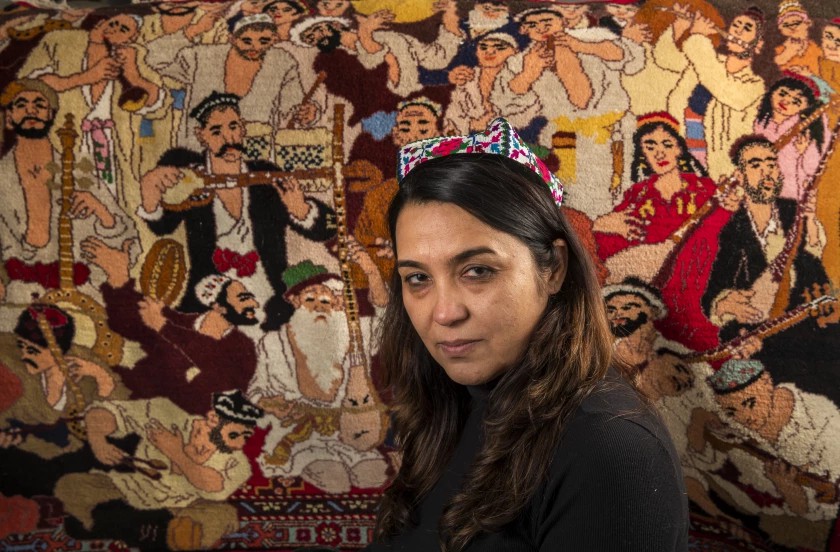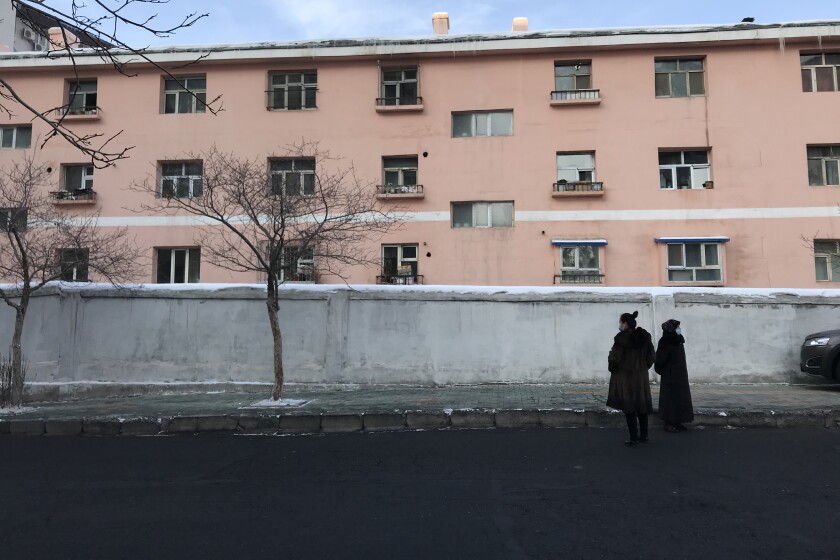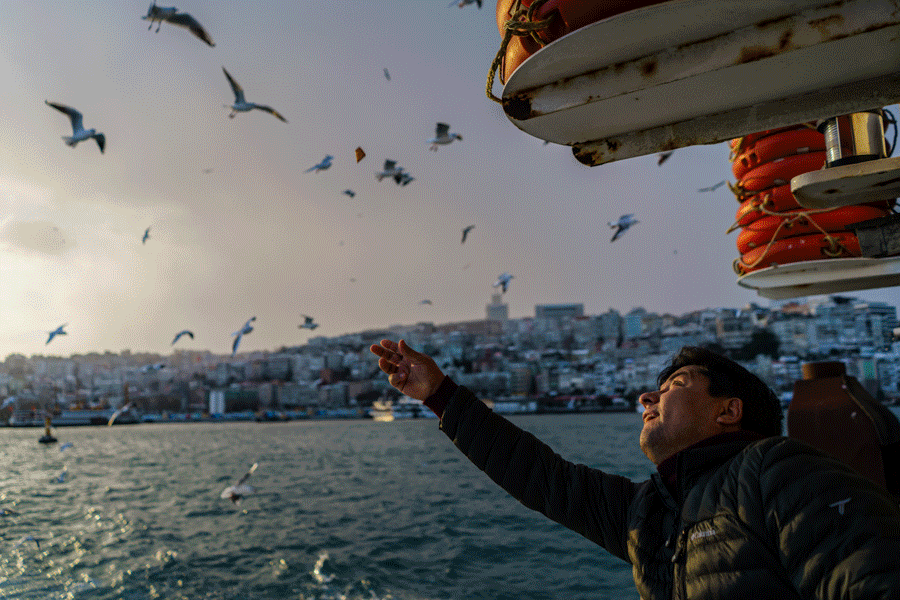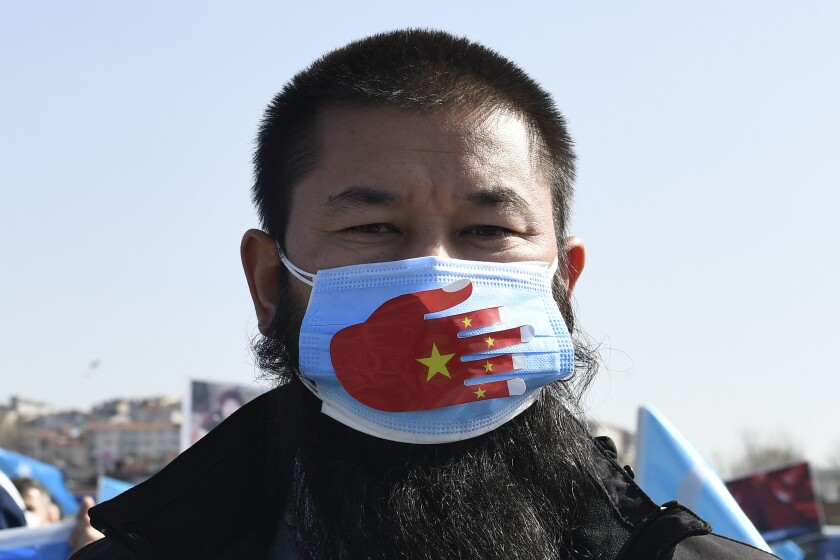With a cheery smile, cross-country skier Dinigeer Yilamujiang gripped the Olympic torch with her fellow Chinese athlete Zhao Jiawen and lit the cauldron for the Feb. 4 opening of the 2022 Winter Olympics, projecting an image of harmonious coexistence between China’s ethnic groups.
More than 6,000 miles away, in Southern California, Erkin Sidick derided the act as a stunt.
Like Yilamujiang, Sidick is from Xinjiang, a northwest region of China that’s home to the Uyghur people, a Turkic ethnic minority that has been oppressed and displaced by the Han Chinese majority. Sidick couldn’t bring himself to watch the opening ceremony. Students he’s mentored in Xinjiang have disappeared, and he cut off contact with his siblings there to protect them as the Chinese government has repressed and incarcerated the Uyghur community in that region.
But from his home in Santa Clarita, he read news about the torch lighter who state-run media said was of Uyghur heritage. And he was struck by one detail of the footage of her family cheering her on from Xinjiang: No men were present.
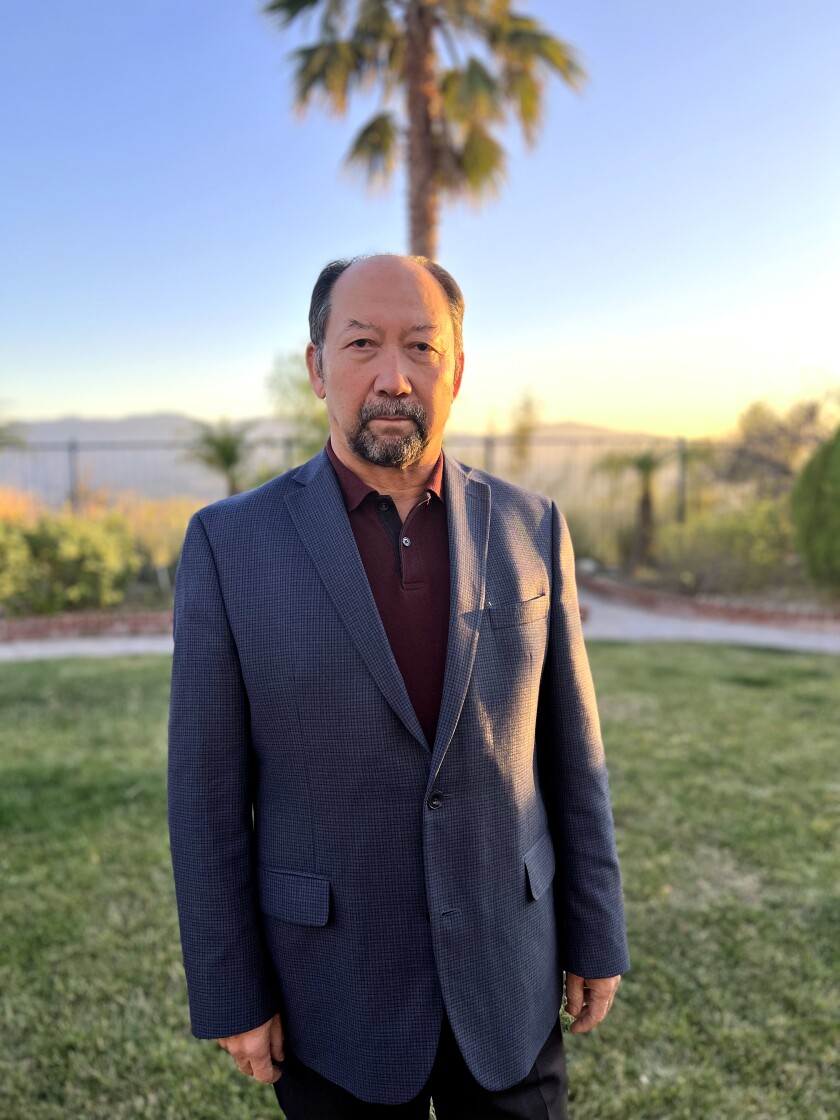
For years, members of the U.S. Uyghur community — which numbers between 8,000 and 10,000, with about 1,000 living in Southern California — has advocated for the world to take action on the human rights abuses occurring in Xinjiang. To many, the International Olympic Committee’s decision to award this year’s Winter Olympics to China felt like a slap in the face.
“This is absolutely shameful,” said Bugra Arkin, 30, who runs a Uyghur restaurant in Alhambra. “The spirit of the Olympics is to bring peace and unite people, but it’s taking place in a country committing genocide.”
Arkin hasn’t heard from his father, who lives in Xinjiang, since he was taken by authorities four years ago and placed in what Arkin calls a “prison camp.” He doesn’t know how long his father will be captive.
For nearly five years, the international community has watched as authorities in northwest China have detained Uyghurs, a predominantly Muslim people swept up in a large-scale social engineering campaign aimed at replacing their identity with a secular Chinese one.
A United Nations committee said in 2018 that it had received credible reports that at least 2 million Uyghurs and other predominantly Muslim minorities were being held in “political camps for indoctrination” in Xinjiang. Sidick says the total number of Uyghurs who have been detained is much higher, potentially as many as 9 million.
“The situation is horrible. Horrible,” said Sidick, 63, a senior optical engineer at NASA’s Jet Propulsion Laboratory in La Cañada Flintridge. “But the world doesn’t want to mention it.”
Chinese authorities have said the detention facilities are a “counterterrorism” strategy enacted due to past riots and Uyghur attacks in the region. The unrest, some of which a separatist movement claimed responsibility for, came in response to repression stemming from the state-sponsored migration of Han Chinese settlers into the Uyghur region.
But the vast majority of those in the camps have no ties to extremist or separatist movements.
In response to the human rights concerns, the U.S., Australia, Britain, Canada and other nations declined to send government representatives to the Games. To many Uyghurs, the diplomatic boycott wasn’t enough. The Games continued and sponsors continued to advertise, even as human rights groups called on leading Olympic corporate sponsors to drop their support or condemn the Chinese government’s persecution.
Neither Airbnb, Alibaba, Allianz, Bridgestone, Coca-Cola, Panasonic, P&G, Samsung, Toyota nor Visa responded to a request for comment from The Times prior to the Olympics about how the companies felt about sponsoring these Games or whether they had changed any of their advertising plans. Intel declined to comment.
Atos said in a statement that it does not comment on issues other than its role as worldwide IT partner for the Olympic and Paralympic Games and that the company enables digital technology for the Games “wherever they take place.”
Omega said in a statement that during its 90 years as the Games’ official timekeeper, its policy is “not to get involved in certain political issues because it would not advance the cause of sport in which our commitment lies.”
This Olympics represents a dilemma for marketers, said Angeline Close Scheinbaum, a sports marketing professor at Clemson University.
The Games provide opportunities to stand up for human rights, but on the business side, an Olympic sponsorship is “traditionally prestigious” and a chance to stand with Olympic ideals of global friendship, respect and equality. And these two considerations don’t always align with those consumers who watch solely for entertainment.
Sponsors were unlikely to change their plans, particularly since the Summer Olympics in Tokyo took place less than a year ago. That gave sponsors minimal time to adjust their marketing plans, according to a sports marketing consultant who advises properties and countries around the world that invest in sports and entertainment properties.
And dropping out would only hurt athletes, said the consultant, who asked not to be identified.
“It’s about supporting the athletes in 206 countries,” the consultant said. “It’s not about necessarily supporting the Games in any one country.”
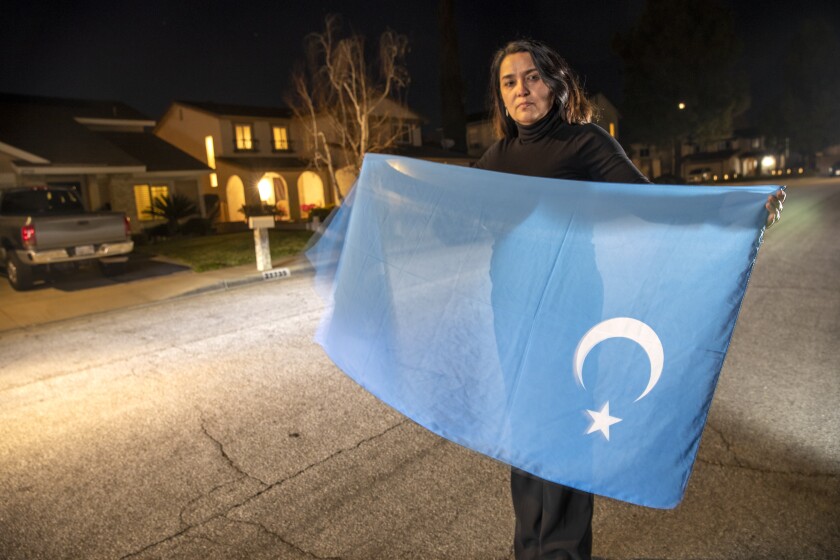
Beijing hosted the Summer Olympics in 2008. At that time, fewer people in the general public knew about the Chinese government’s treatment of the Uyghur community, though there were indications of discrimination, such as reports of signs in Chinese in hotels that warned against renting to Uyghurs, said James Millward, author of “Eurasian Crossroads: A History of Xinjiang.”
The 2008 Summer Olympics were painted as a “grand party,” he said, at which much of the international community’s focus was on new buildings and a “China comes into its own” narrative.
Given the current international attention on treatment of the Uyghur people, Millward wasn’t surprised to see Yilamujiang included in this year’s opening ceremony. The 20-year-old cross-country skier is a first-time Olympian and finished in 43rd place out of 65 competitors in the cross-country skiathon on the first day of the Games. After her race, she left without talking to journalists, according to the Wall Street Journal.
“She was used to make precisely the point that the PRC wants to make about Uyghurs and other Xinjiang people,” he said, using an acronym for the People’s Republic of China. “That everything is fine, the policies are working, and Uyghur and Han cooperate well.”
Nurnisa Kurban of Santa Clarita remembered how activists rallying for Uyghur and Tibetan rights protested in the streets of San Francisco ahead of the 2008 Beijing Olympics. Yet the Games still took place.
“Twelve years later, we’re still talking about the Winter Olympics,” said Kurban, 47, a board member for advocacy group Uyghur LA. “I really appreciate the diplomatic boycott, and I think it’s sending a message to the Chinese government that the world is watching, but what is the impact? Did it stop the Olympics being held there?”
For years, Kurban and other members of the Southern California Uyghur community have protested and spoken to elected officials and academic institutions about the incarceration, forced labor and cultural erasure of Uyghurs in Xinjiang. It’s advocacy she does after her day job as a high school principal.
“I really don’t know what to say,” she said. “I don’t know what else we have to present for those companies, for those governments.”
Northern California resident Kasim, 49, who did not want his last name used for fear of reprisals from the Chinese government, said that before he immigrated to the U.S., he believed America would help his Uyghur community. He now describes that thinking as a “naïve dream.”
“The U.S. government isn’t going to do anything until the people demand them to do something,” he said.
Kasim said he believes China wanted to host the Games to “present to the world how happy and prosperous and open China is” and to “control the narrative” about the country.
“Sports watching is one of the best ways that dictatorships and oppressive governments are able to benefit from this and try to make themselves look good through the one thing that brings people together,” said Irade Kashgary, a board member of the nonprofit advocacy group Uyghur American Assn.
The situation has put athletes in a difficult position at the Games, one with which some Uyghurs sympathize.
“I don’t blame athletes for going to the event,” said a 33-year-old Brentwood resident who did not want his name used to protect family back in Xinjiang. “It’s not their fault it’s in Beijing. They’ve dedicated their entire lives to their trade, and for a lot of them, this is their one chance to shine.”
He, instead, blames the IOC and corporate sponsors for putting the athletes in this spot. Though he’s a fan of the Olympics, and an avid skier and snowboarder, he wasn’t going to watch the Games, which wrap up this weekend.
“I don’t think I have the stomach to watch it,” he said.
